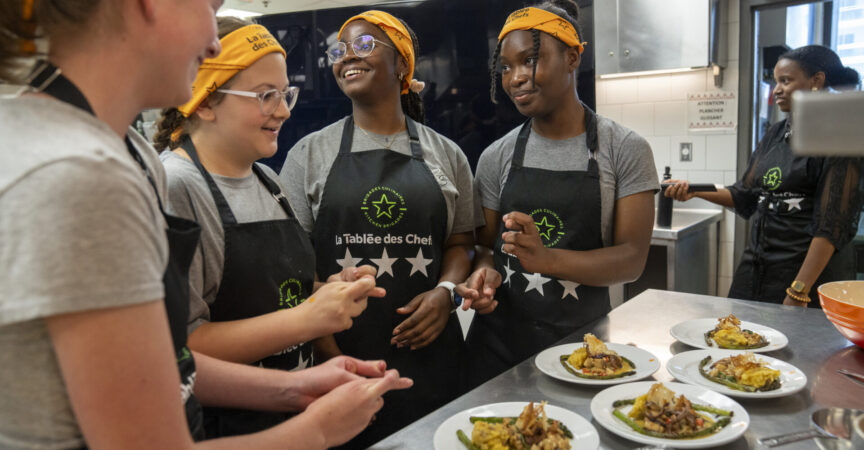At the Intersection of Sustainability and Social Change: Chef Jean-François Archambault’s La Tablée des Chefs
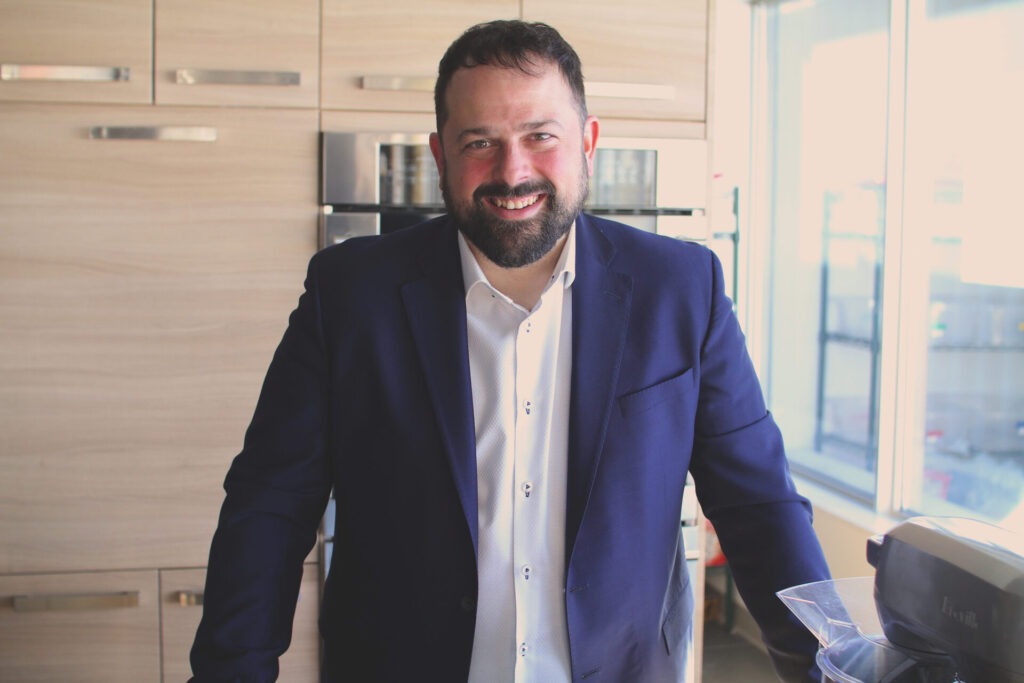
Since its inception in 2002 by Chef Jean-François Archambault, La Tablée des Chefs has been on a mission to combat food insecurity while fostering culinary education. Under Archambault’s visionary leadership, the Longueuil, Québec organization has expanded its reach beyond its celebrated food education offering, to initiatives that recover surplus food and redistribute it to those in need, creating a powerful model of sustainability and social impact.
Recently, La Tablée des Chefs has found new visibility at high-profile events like the Canadian Formula 1 Grand Prix, the Indy races, and other large-scale events where they are implementing their food recovery program on a grand scale. The team’s efforts ensure that surplus food from these massive events does not go to waste, instead making its way to local communities in need.
We caught up Chef Archambault, known affectionately as “JF”, during a working vacation in the Eastern Townships where he’d carved out a little time to recalibrate and focus on family. Don’t be fooled though, with the organization’s signature event series, Les Grandes Tablées, just around the corner and already sold out in its three host cities (Montreal, Québec City and Toronto), he’s already focused on what’s next in the evolution of La Tablée des Chefs.
MM: La Tablée des Chefs, and your signature event series, Les Grandes Tablées, are one of the greatest examples of the power of the foodservice community to work together to make real change. Can you share a little bit about how you’ve grown the organization since the early 2000s?
JFA: For me, since my culinary training in Institut de tourisme et d’hôtellerie du Québec in Montreal, and during my hotel management course, knowing that the food we were throwing away could have fed people, was a wakeup call. It still is today.
From the start, it’s been about seeing good quality food not reaching people who really need it. Beyond food waste, is the fact that there’s such incredible need all around us we don’t seem to notice. Most people don’t seem to understand how stressful the food insecurity scene is right now. How hard it is to source food for people in need. People assume organizations are well supported and funded, but that’s not the case.
I started this alone in 2005 when I left the hotel industry to work full time on this project. I started from my basement. Now, we have a team of over 55 staff who share the dream. It’s no longer just my dream, it’s a shared and common dream, so we can make real change. Now, my focus is on making systemic and sustainable change so that it outlives us, so that food recovery becomes part of a regular process the industry will put in place and keep in place as a best practice.
When we were doing F1, knowing the Indy race was coming in July, I tried to see who I could contact and move our team into place. We have built partnerships with institutions like Centennial College and George Brown to activate our programs anywhere in the country. The ecosystem is there, and it’s growing. When I see the potential of the impact we can have, our growth in the ability to feed people and educate youth on building culinary independence through knowledge and skills, to be able to feed themselves and their families, I am embracing what we’ve been working on to grow awareness and support.
MM: So, you’ve seen your idea take flight, and you’re looking for ways to build it into the social and institutional ecosystem?
JFA: For an initiative to become systemic, working within an ecosystem on a common issue, you need to build influence. When I started with just one or two chefs and establishments doing food recovery, I reached out to the president of a kitchen appliance company for fundraising. Even then, I was talking about La Tablée like it had already achieved the success of my vision. He said, “Oh yeah? How many chefs do you have now?” From the start, if you keep sharing your vision while it’s not where you want it to be, it’s always getting closer. Having a clear vision and a team that understands it brings it within reach. Now, I’m more like a coach, and I love that role. I’m still 95% responsible for the funding of the organization, but I hover above the operations, sharing thoughts and ideas and working on relationships, and I really enjoy that.
MM: What was your motivation for the creation of the Brigades?
JFA: Early on, we were recovering food at the Bell Centre with the Canadiens back in 2005-06. That year, I jumped fully into La Tablée and we created a culinary summer camp for sixth graders going into high school. We partnered with a summer camp in the Laurentians, and we managed all of the meals and themed the week as a culinary camp. We had a relationship with the Canadiens, so we had players who came, as well as Youppi!, the Canadiens’ mascot. I was on the executive board of Moisson Montréal, the local food bank, and there was a public health study that came out that talked about the loss of culinary knowledge and skills, particularly in underprivileged areas. At the same time, in 2004, home economics was removed from the curriculum in schools in Québec and across Canada. They also removed fast food from the school system at that time, but without explaining why that was important. I asked myself who had the knowledge and skills to share to address that obvious gap…other than grandmothers. For me, that was cooks and chefs.
My dad was the lawyer of the Chefs Association of Québec for 25 years, so I grew up among them. They were so generous and happy to share time with charities and help out. They were so passionate and generous, even at the cost of their personal and family time. I thought that while I’m working to mobilize chefs to combat food recovery, there’s another need: the loss of food knowledge and skills. What if we took those home economics classes and turned them into workshops with chefs? That’s how we crated the Brigades.
We started with four pilot schools that demonstrated the greatest need, and when those were successful, in 2006 we were given Polyvalente St. Henri, Chomedey-De Maisonneuve, Pierre-Dupuy, and Louis-Joseph Papineau. These were tough schools with regular police presence. We ran the workshops there.
MM: How did registration work?
JFA: I went into the schools myself. We had a table during lunchtime, and we had to pitch it. We had 25 spots to fill for the school year, over 24 weeks.
MM: How did it go?
JFA: We were surprised it was mainly boys, actually. We thought we would get girls at first. We had this tall guy come up to register for the Tuesday evening session, and we asked him why he was interested. He said, “At least I’m going to eat every Tuesday night.”
We were shocked. That wasn’t the reason we’d planned to do this, but if that was the reason students were motivated, we were committed to feeding them. It gives you a sense of the real need, and we didn’t see that coming.
MM: So, you’ve seen an intersection between food education and insecurity.
JFA: If you’re going to have the tightest budget to feed yourself and your family, you need to be the highest skilled to do it. The people who are struggling the most need the greatest skills to succeed, and that’s not the case right now. That’s why we scaled and brought chefs to schools.
The following year we had ten schools, then thirty schools and this fall, we’ll have chefs in 275 schools, with a little more than 60 schools outside of Québec. In Québec, we’re only 125 schools away from being in all schools across the province, which is amazing.
It’s $2,000 for a school to register for our program and $9,000 is a hard cost funded by our partners. It’s free for all kids in qualifying schools, determined at the district level.
We also saw needs in privileged and even private schools. They reached out to us saying that their students didn’t know how to cook. Their parents were working late, and the kids were ordering food in and eating prepared foods. So, now private schools have signed up and they pay the full program price of $11,000, and the families reimburse that at about $400 per student, which is less than piano lessons or sports.
MM: What effect does the Brigade experience have on the students who enrol in the program?
JFA: You meet teenagers who no one has ever thought of as a leader, but they end up being the chef of their brigade. They find themselves in the kitchen.
Right now, we register about 7,000 youth in the program each year. Easily ten per cent of them really connect with the industry, and that’s a safe number because we don’t have actual metrics. We never saw the shortage of food industry workers coming, and that has put pressure on the culinary schools to recruit more students. Front of house program enrollment has really declined in particular, so the schools are engaging with us to have conversations with students about careers in the foodservice and hospitality industry. We’ve really opened that up. We’re exploring the synergies between culinary schools and the Brigades more and more, to show students the potentials of pursuing a career within the industry.
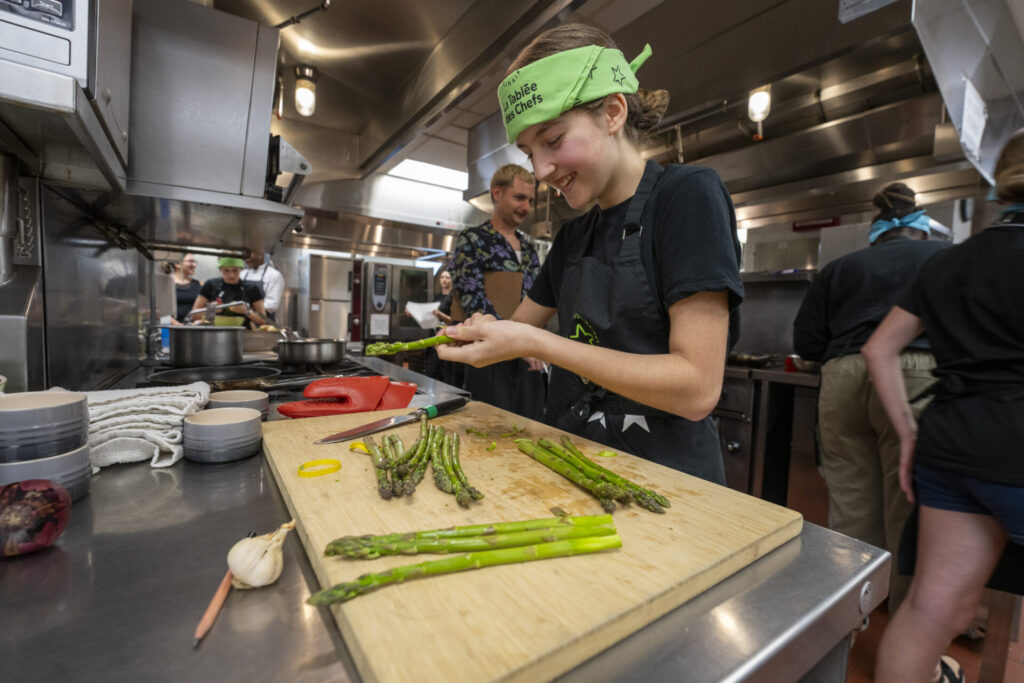
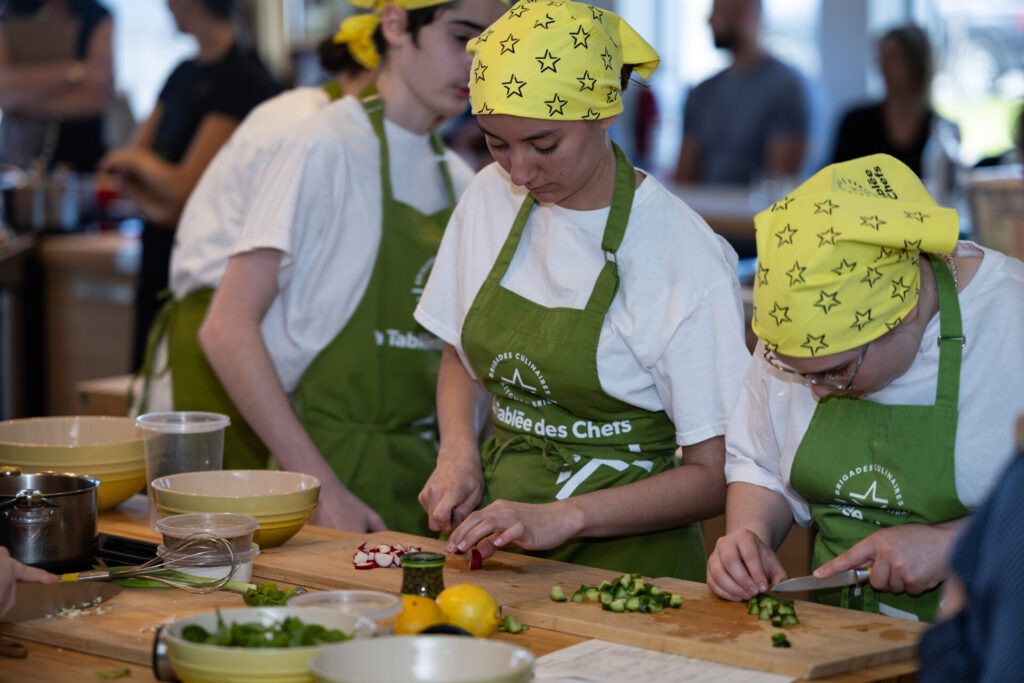
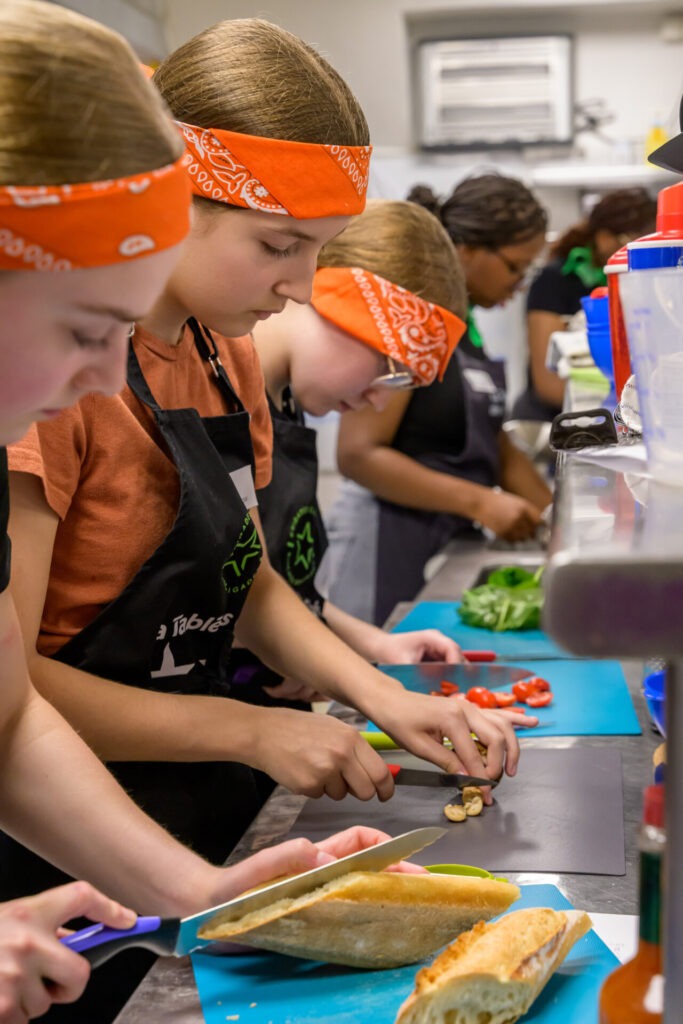
MM: We realize you are still in the midst of your journey, but what are you most proud of so far, and where do you want to go?
JFA: The pandemic was really, really hard. We thought we were going to have to downsize. The opposite happened, actually. We had thought that food insecurity would spike during the pandemic and we wanted to connect with kids at home in their kitchens in a different way, so we focused on Solidarity Kitchens, our meal program that raises awareness of food insecurity.
After the pandemic, Marriott came on board nationally and we built collaborative relationships with key people. We’ve stayed focused and kept our eyes on the ball, steering in the right direction, even through adversity. I’ve always looked beyond where we actually are to where we will be, and that’s one of the things I’m most proud of.
When we lost key funding from a foundation partner after the pandemic, I was really crushed, but we didn’t give up. We got Unilever and other partners to come in. We lowered our enrollment expectations and kept at it.
Just ten percent of our funding comes from government, and, with the exception of some funding during the pandemic, none of that is federal. We raise ninety per cent of our funds. When I meet with ministers, I ask why a community organization that brings as much to the table as La Tablée shouldn’t receive a minimum of twenty per cent of its funding from the government. With our success in Québec, there’s no reason why we shouldn’t see the same success in other provinces as the need for our program is the same or greater.
I see the need and, while we can’t scale as fast as we need to meet that need, we are actively in the game. We are a key player in Canada. I am very proud of our team and where we are.
Even though I’m still young, I think a lot about how to make sure this organization outlives me. We’re focused on creating a resilient and sustainable movement, and long-term funding is a big part of that. We’re a social enterprise that generates real impact and covers the gap in social services the government can’t.
Our Cook Up Your Future program is aimed at youth in child protection services—kids in transition. Tell me they don’t need support in learning how to cook and manage meals by themselves. I have the stats, and eighty-five per cent of them have never been to a grocery store before enrolling in the program. But, at 17 years old, we expect them to manage a budget, plan their own meals and cook for themselves? It doesn’t make sense.
We’ve proven to be much more efficient and highly effective on the community side than government could ever be. We’re not asking for a blank cheque, we’re asking for support to grow and do the work we’re ideally positioned to do for youth who need it.
To learn more about getting involved and to lend your support, please visit their website.



